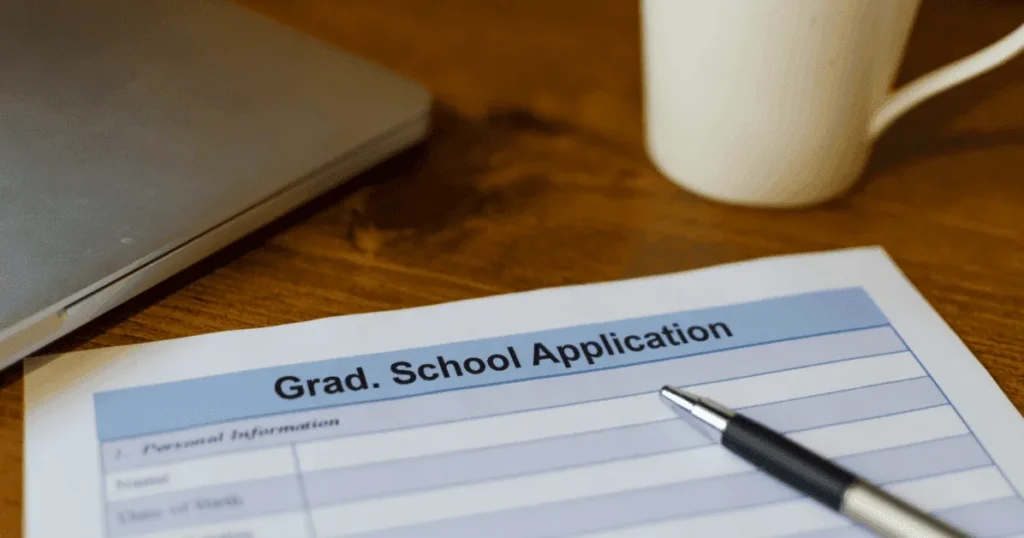Applying to graduate school can be a pivotal step in advancing your academic and professional career. The admissions process, however, is often rigorous, with multiple components that must be executed effectively. Whether you’re pursuing a master’s or a Ph.D., crafting a compelling and well-rounded application is essential to standing out. Below are key tips to help you navigate the graduate school admissions process successfully and boost your chances of acceptance.

1. Research Your Programs in Detail
Before starting your application, it’s crucial to research the graduate programs that interest you. A well-targeted application will highlight why you’re a great fit for a specific program. Here’s how to approach your research:
- Explore Faculty Research Interests: Ensure there are faculty members whose research aligns with your academic goals.
- Look at Program Strengths: Consider each program’s focus, ranking, and reputation in your specific area of study.
- Assess Location and Campus Resources: Factor in the geographical location, resources like libraries and labs, and the campus community.
2. Create an Application Timeline
Graduate school applications typically have several moving parts that can take time to complete. Starting early is key to submitting a polished application.
- Set Milestones: Create a timeline to track when to complete specific tasks, such as taking exams, writing your statement of purpose, and requesting recommendation letters.
- Organize Required Documents: Keep track of all application materials like transcripts, writing samples, and resumes.
- Track Deadlines: Graduate programs have different deadlines. Make sure to stay on top of each school’s submission dates.
3. Write a Strong Statement of Purpose
Your statement of purpose (SOP) is one of the most important parts of your graduate school application. It gives the admissions committee insight into who you are, your academic interests, and why you’re applying to their program.
- Be Clear and Specific: Explain your academic background, research interests, and career aspirations in a clear and direct manner.
- Show Why You’re a Good Fit: Tailor your SOP to each program by referencing specific faculty members, research opportunities, and program features that interest you.
- Tell Your Story: Use your personal journey and experiences to show your passion for the field and what has led you to pursue graduate studies.
4. Obtain Strong Letters of Recommendation
Your letters of recommendation play a crucial role in validating your potential as a graduate student. Choose recommenders who can provide a detailed assessment of your academic abilities and professional achievements.
- Select the Right Recommenders: Ideally, your recommenders should be professors or professionals who know your work well and can speak to your strengths and potential.
- Provide Necessary Information: Supply your recommenders with your resume, statement of purpose, and any specific points they should address in their letter.
- Give Them Ample Time: Reach out to your recommenders at least a month before the application deadline to ensure they have time to write a thoughtful letter.
5. Ace Standardized Tests
Many graduate programs require standardized test scores as part of the admissions process, such as the GRE, GMAT, or LSAT. Preparing adequately can make a difference in your application.
- Prepare Strategically: Take several practice tests to familiarize yourself with the exam format and focus on improving areas of weakness.
- Take the Test Early: Schedule your test date well ahead of deadlines, allowing time for retakes if needed.
- Send Scores to Programs: Make sure your test scores are submitted to each graduate program by the required deadline.
6. Craft a Professional Resume or CV
Your resume or CV is an opportunity to present your academic and professional achievements concisely. Focus on showcasing relevant experience that reflects your readiness for graduate study.
- Highlight Research Experience: Include research projects, internships, and any academic publications or conference presentations.
- List Relevant Work Experience: Emphasize jobs or volunteer work that demonstrate skills applicable to your field of study.
- Include Skills and Certifications: Mention any technical skills, certifications, or training relevant to the program you’re applying for.
7. Prepare for Interviews (If Required)
Some graduate programs may include an interview as part of the admissions process. This is your chance to further demonstrate your passion for the field and fit for the program.
- Review Your Application Materials: Be ready to discuss the details of your research interests, experiences, and career goals.
- Practice Interview Questions: Prepare answers for common questions like “Why do you want to join this program?” and “What are your long-term goals?”
- Demonstrate Enthusiasm: Show genuine interest in the program, faculty, and research opportunities during the interview.
8. Address Weaknesses in Your Application
If there are any weaknesses in your application, such as a low GPA or lack of experience, don’t shy away from addressing them. You can provide explanations in your SOP or additional materials.
- Explain Gaps Positively: If you have any gaps in your academic history or a lower-than-average GPA, briefly explain the circumstances and focus on what you’ve learned or how you’ve grown.
- Highlight Other Strengths: Use the rest of your application to showcase other strengths, such as strong letters of recommendation or significant research experience.
9. Apply to a Range of Schools
To improve your chances of acceptance, apply to a balanced mix of schools, including reach, match, and safety options.
- Reach Schools: These are programs where acceptance rates are low, and your qualifications might fall slightly below the average.
- Match Schools: Schools where your qualifications closely align with the average admitted student.
- Safety Schools: Programs where your qualifications exceed the average, giving you a higher likelihood of acceptance.
10. Stay Engaged Post-Submission
Once you’ve submitted your application, there are still steps you can take to stay engaged with the admissions process.
- Verify Application Completion: Contact the admissions office to confirm that all materials have been received.
- Provide Updates: If you receive new awards, publish research, or gain relevant experience after submitting your application, you can inform the admissions committee.
- Follow Up with Recommenders: Check in with your recommenders to make sure they’ve submitted their letters on time.
Conclusion
Applying to graduate school requires careful planning, attention to detail, and a clear strategy. By researching programs, crafting a strong statement of purpose, securing solid recommendation letters, and staying organized, you’ll be well-positioned to submit a competitive application. Remember that the graduate school admissions process is as much about fit as it is about qualifications, so make sure your application reflects why you’re a great match for each program.
